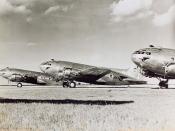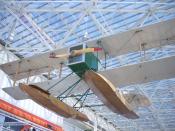The Boeing Company has been critical to the United States for over 60 years in both war and peace.
During World War II, it produced the B17 and B29 bombers that were the heart of the military bombing campaign against the Axis powers.
In 1958, the 707, Boeing's first successful civilian passenger plane, began commercial operation and was so successful that 348 of that model are still flying today.
When in 1969 Boeing came out with its long-range 747 jumbo jet, the company became the largest exporter of any corporation in the United States.
During the 1990s, the company underwent rapid expansion, acquiring Rockwell International, a major aerospace and defense company in 1996, competing aircraft manufacturer McDonnell Douglas in 1997, and Hughes Aircraft, a leading space and communications company in 2000.
Today, with over 180,000 employees, Boeing is a giant producer of passenger planes, business jets, fighter planes, helicopters, flight instruments, and even satellites and missiles.
Although Boeing is a major force in the aerospace, defense, and communications industries as well as the commercial airline industry, its path to growth and prosperity has become clouded.
In its commercial airline business it faces a formidable competitor. Airbus Industrie had been established in 1971 by the British and French governments and was immediately subsidized by these governments. In 1996, Airbus decided to challenge Boeing for the jumbo jet market, then ruled exclusively by Boeing with its 416-seat long-distance 747-400.
Airbus predicts air travel will expand rapidly during the next decade, requiring many giant jumbo jets. Its Airbus A380 seats 555 passengers, and is the world's largest jetliner. It features a full double-deck rather than the 747's shorter second story "hump," and later versions could eventually be stretched to accommodate over 650 seats. The A380's major benefit would be that by carrying more...


